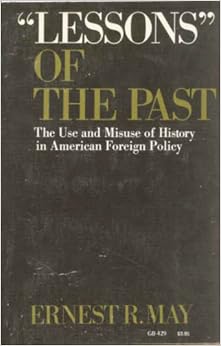I have just read the first two chapters of "Lessons" of the Past: The Use and Misuse of History in American Foreign Policy by Ernest R. May. The chapters, published in 1975, deal with the Roosevelt administration's planning for post World War II foreign policy during the war, and the Truman administration's thinking at the beginning of the Cold War. May, a Harvard history professor knows more about the deliberations and events of those years than I will even know, and I am finding his brief discussions interesting and informative.
May was writing half a century ago about foreign policy decisions made some 70 years ago. I suspect things have changed in some important ways -- the nation is more experienced as a global power, our intelligence apparatus has increased greatly, and our leaders have never personally experienced a world war. Still, I think the book is well worth thinking about!
In a way, foreign policy is like multidimensional chess. It is based on guesses of what the other fellow intendeds, what moves he will make, and how he will respond to your moves. But in foreign policy, there is not a single opponent. Rather the U.S. president is facing a number of potential enemies, and a number of allies who may or may not support his actions. Moreover, the spaces in the game of foreign policy are not blank, but have their own reasons and behaviors; as Truman was wondering if the USSR would move against Greece and Turkey, the different factions in Greece and Turkey were important potential actors. And of course there was a band of countries stretching from Finland to Korea, and including states in central and eastern Europe, the middle east, India, Indonesia and Vietnam, not to mention Germany, Italy and Japan.
May shows that the president has White House advisors and advisors from other parts of the executive branch, notably the State Department and the military and the Treasury Department. Roosevelt also had a strong OSS feeding him information, but Truman disbanded the OSS and did not create the CIA for some time; moreover, Truman had intelligence from military sources channeled to the White House via the State Department. Of course, as May recognized, the Congress and the public influence foreign policy decisions.
May points out that Truman chose advisors who tended to be conservative in outlook, while Roosevelt depended on more liberal advisors. He suggests that Roosevelt (who was Assistant Secretary of the Navy in the Wilson administration during World War I) was significantly influenced by his perception of the ways that the peace following World War I had set the seeds for World War II, especially for the rise of Hitler and German military ambitions, He suggests that Truman (a captain during World War I) was influenced by his perception that appeasement of Germany during the 1930s led to World War II. He is also aware of the character of the president.
As I read May, he is saying that the ideological tone of the president and his advisors influences the way they read current events and the character of other nations; he also suggests that the availability in memory of strongly felt historical precedents affects the way that a president understands events and advice.
I wonder whether there is not more "muddling through" and less comprehensive pre-planned policy. Unexpected events arise so quickly and so often, that a lot of what is done is responsive rather than policy based initiatives.
I would also differentiate between historical precedent and understanding current culture and leadership of other countries. Truman and Roosevelt needed to understand the current situation in Russia, Britain, Germany, Japan, and many other countries. Understanding the history of those countries (and the stories people told themselves about those histories) was certainly necessary to understanding the country, but it was also necessary to understand the current political systems and leadership, the economy, the aspirations of the people, the media, etc. Experience has shown that the U.S. has again and again gotten into trouble by failing to understand the culture of countries important to us -- Syria, Iraq, Afghanistan, Pakistan, and Vietnam being only relatively recent examples strongly available to my memory.
May suggests that it would be important for a variety of precedents to be considered as the White House contemplates major foreign policy decisions. Oversimplifying, the failure of the League of Nations was not the only precedent the FDR administration should have considered, nor was Chamberlain at Munich the only precedent Truman should have considered.
The White House has a Council of Economic Advisers and a Council of Scientific Advisers. Perhaps it should also have a Council of Historians. They would brief the president and White House staff from time to time on historical precedents to a current foreign policy situation, identifying the similarities and the differences in each situation. They might also include in such briefings, a review of the decisions that were made, and how they worked out over time. Historians might also provide occasional briefings about how foreign policy decisions were made in earlier administrations (and indeed, if relevant, in other countries in the past). Such briefings might identify the aspects of the decision making that seemed relevant to the success of failure of the decisions made.

No comments:
Post a Comment